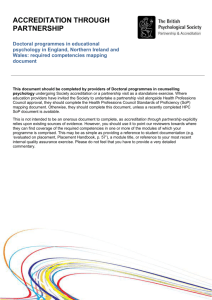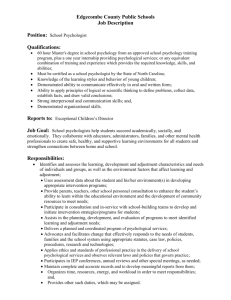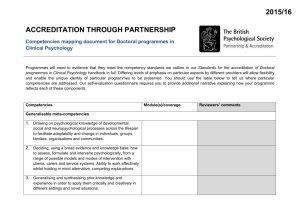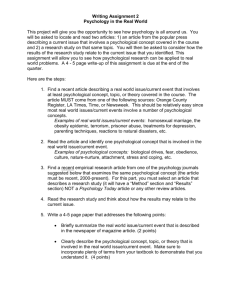Competences mapping document for QiCN applicants with doctoral
advertisement
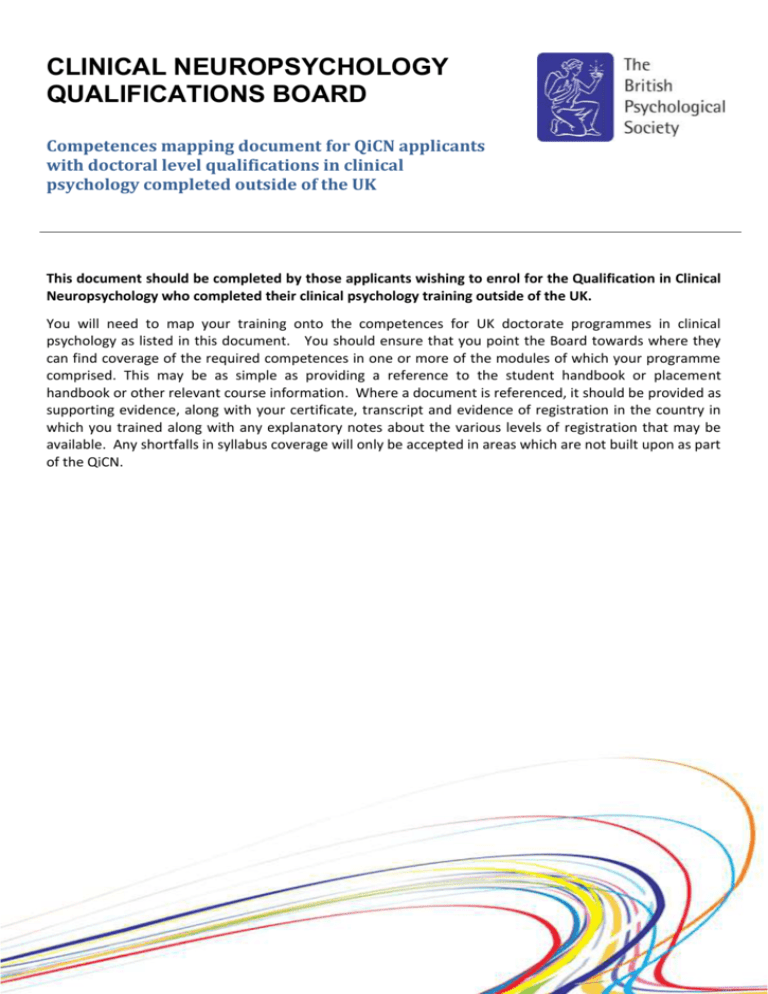
CLINICAL NEUROPSYCHOLOGY QUALIFICATIONS BOARD Competences mapping document for QiCN applicants with doctoral level qualifications in clinical psychology completed outside of the UK This document should be completed by those applicants wishing to enrol for the Qualification in Clinical Neuropsychology who completed their clinical psychology training outside of the UK. You will need to map your training onto the competences for UK doctorate programmes in clinical psychology as listed in this document. You should ensure that you point the Board towards where they can find coverage of the required competences in one or more of the modules of which your programme comprised. This may be as simple as providing a reference to the student handbook or placement handbook or other relevant course information. Where a document is referenced, it should be provided as supporting evidence, along with your certificate, transcript and evidence of registration in the country in which you trained along with any explanatory notes about the various levels of registration that may be available. Any shortfalls in syllabus coverage will only be accepted in areas which are not built upon as part of the QiCN. 1 Required competencies Module(s)/coverage 1. Transferrable skills 1. Deciding, using a broad evidence and knowledge base, how to assess, formulate and intervene psychologically, from a range of possible models and modes of intervention with clients, carers and service systems. 2. Generalising and synthesising prior knowledge and experience in order to apply them critically and creatively in different settings and novel situations. 3. Demonstrating self-awareness and sensitivity, and working as a reflective practitioner. 4. Ability to think critically, reflectively and evaluatively. 5. Making informed judgements on complex issues in specialist fields, often in the absence of complete information. 6. Ability to communicate psychologically-informed ideas and conclusions clearly and effectively to specialist and non-specialist audiences, in order to facilitate problem solving and decision making. 7. Exercising personal responsibility and largely autonomous initiative in complex and unpredictable situations in professional practice. 8. Drawing on psychological knowledge of complex developmental, social and neuropsychological processes across the lifespan to facilitate adaptability and change in individuals, groups, families, organisations and communities. 9. Ability to work effectively whilst holding in mind alternative, competing explanations. 2. Psychological assessment 1. Developing and maintaining effective working alliances with clients, including individuals, carers and services. 2. Ability to choose, use and interpret a broad range of assessment methods appropriate: • to the client and service delivery system in which the assessment takes place; and • to the type of intervention which is likely to be required. 3. Assessment procedures in which competence is demonstrated will 2 include: • formal procedures (use of standardised psychometric instruments) • systematic interviewing procedures • other structured methods of assessment (e.g. observation, or gathering information from others); and • assessment of social context and organisations. 4. Conducting appropriate risk assessment and using this to guide practice. 3. Psychological formulation 1. Developing formulations of presenting problems or situations which integrate information from assessments within a coherent framework that draws upon psychological theory and evidence and which incorporates interpersonal, societal, cultural and biological factors. 2. Using formulations with clients to facilitate their understanding of their experience. 3. Using formulations to plan appropriate interventions that take the client’s perspective into account. 4. Using formulations to assist multi-professional communication, and the understanding of clients and their care. 5. Revising formulations in the light of ongoing intervention and when necessary reformulating the problem. 4. Psychological intervention 1. On the basis of a formulation, implementing psychological therapy or other interventions appropriate to the presenting problem and to the psychological and social circumstances of the client(s), and to do this in a collaborative manner with: • individuals • couples, families or groups • services/organisations 2. Understanding therapeutic techniques and processes as applied when working with a range of different individuals in distress, including those who experience difficulties related to: anxiety, mood, adjustment to adverse circumstances or life events, eating, psychosis and use of substances, and those with somatoform, psychosexual, developmental, personality, cognitive and neurological presentations. 3. Ability to implement therapeutic interventions based on knowledge and practice in at least two evidence-based models of formal psychological therapy, of which one must be cognitivebehaviour therapy. 3 4. Having an awareness of the impact of psychopharmacological and other clinical interventions. 5. Understanding social approaches to intervention; for example, those informed by community, critical, and social constructionist perspectives. 6. Implementing interventions and care plans through and with other professions and/or with individuals who are formal (professional) carers for a client, or who care for a client by virtue of family or partnership arrangements. 7. Recognising when (further) intervention is inappropriate, or unlikely to be helpful, and communicating this sensitively to clients and carers. 5. Evaluation 1. Selecting and implementing appropriate methods to evaluate the effectiveness, acceptability and broader impact of interventions (both individual and organisational), and using this information to inform and shape practice. Where appropriate this will also involve devising innovative procedures. 2. Auditing clinical effectiveness. 6. Research 1. Identifying, reviewing and critically appraising a substantial body of research evidence which is at the forefront of clinical psychology practice. 2. Understanding applicable techniques for clinical research and advanced academic enquiry, including quantitative and qualitative approaches. 3. Conducting service evaluation and small N research. 4. Conducting collaborative research. 5. Conceptualising, designing and conducting independent, original research of a quality to satisfy peer review, extend the forefront of the discipline, and merit publication: including identifying research questions, demonstrating an understanding of ethical issues, choosing appropriate research methods and analysis, reporting outcomes and identifying appropriate pathways for dissemination. 6. Understanding the need and value of undertaking clinical research and development post-qualification, contributing substantially to the development of theory and practice in clinical psychology. 7. Personal and professional skills and values 4 1. Understanding of ethical issues and applying these in complex clinical contexts, ensuring that informed consent underpins all contact with clients and research participants. 2. Appreciating the inherent power imbalance between practitioners and clients and how abuse of this can be minimised. 3. Understanding the impact of differences, diversity and social inequalities on people’s lives, and their implications for working practices. 4. Understanding the impact of one’s own value base upon clinical practice. 5. Working effectively at an appropriate level of autonomy, with awareness of the limits of own competence, and accepting accountability to relevant professional and service managers. 6. Managing own personal learning needs and developing strategies for meeting these. 7. Using supervision to reflect on practice, and making appropriate use of feedback received. 8. Developing strategies to handle the emotional and physical impact of own practice and seeking appropriate support when necessary, with good awareness of boundary issues. 9. Working collaboratively and constructively with fellow psychologists and other colleagues and users of services, respecting diverse viewpoints. 10. Monitoring and maintaining the health, safety, and security of self and others. 8. Communication and teaching 1. Communicating effectively clinical and non-clinical information from a psychological perspective in a style appropriate to a variety of different audiences (for example, to professional colleagues, and to users and their carers). 2. Adapting style of communication to people with a wide range of levels of cognitive ability, sensory acuity and modes of communication. 3. Preparing and delivering teaching and training which takes into account the needs and goals of the participants (for example, by appropriate adaptations to methods and content). 4. Understanding of the supervision process for both supervisee and supervisor roles. 5 5. Understanding the process of providing expert psychological opinion and advice, including the preparation and presentation of evidence in formal settings. 6. Understanding the process of communicating effectively through interpreters and having an awareness of the limitations thereof. 7. Supporting others’ learning in the application of psychological skills, knowledge, practices and procedures. 9. Service delivery 1. Adapting practice to a range of organisational contexts, on the basis of an understanding of pertinent organisational and cultural issues. 2. Providing supervision at an appropriate level within own sphere of competence. 3. Understanding of consultancy models and the contribution of consultancy to practice. 4. Understanding of leadership theories and models, and their application to service development and delivery. 5. Awareness of the legislative and national planning context of service delivery and clinical practice. 6. Working effectively with formal service systems and procedures. 7. Working with users and carers to facilitate their involvement in service planning and delivery. 8. Working effectively in multi-disciplinary teams. 9. Understanding of change processes in service delivery systems. 10. Understanding quality assurance principles and processes. 6
